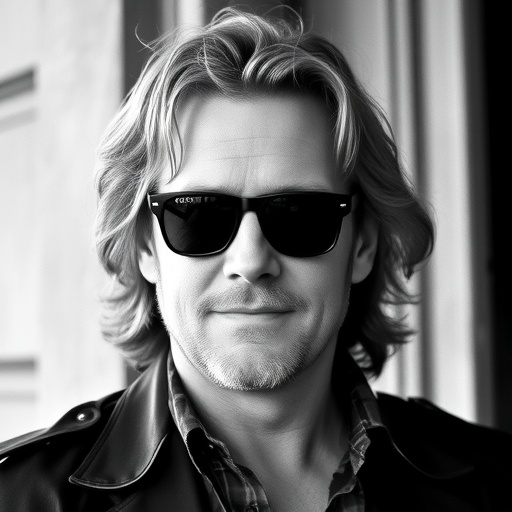Val Kilmer Dies at 65: Beloved Star of ‘The Doors’ and ‘Tombstone’ Leaves Hollywood in Mourning
In a shocking loss to the entertainment world, Val Kilmer, the versatile actor celebrated for his mesmerizing portrayals in The Doors and Tombstone, has passed away at the age of 65. The news, confirmed by his family on a quiet Tuesday morning, has sent ripples of grief through Hollywood and beyond, with fans and colleagues alike remembering him as a magnetic talent whose intensity on screen was matched only by his off-screen charisma. Kilmer’s death comes after years of battling health issues, but his legacy as one of the most enigmatic figures in modern cinema remains untarnished.
- Val Kilmer’s Transformative Role as Jim Morrison in ‘The Doors’
- The Gunslinger Glory: Kilmer’s Unforgettable Doc Holliday in ‘Tombstone’
- Val Kilmer’s Private Battle with Throat Cancer and Hollywood’s Silent Support
- Tributes Pour In: Hollywood Stars and Fans Honor Val Kilmer’s Legacy
- Looking Ahead: Val Kilmer’s Influence on Future Filmmakers and Biopics
Born on December 31, 1959, in Los Angeles, Val Kilmer grew up in a creative environment that foreshadowed his future in the arts. From his early days at the Hollywood Professional School, where he honed his acting skills alongside future stars, to his breakout roles in the 1980s, Kilmer’s career was a testament to raw talent and unyielding dedication. His passing marks the end of an era for actors who bridged the gap between method acting and blockbuster appeal, leaving behind a filmography that continues to inspire new generations.
Val Kilmer’s Transformative Role as Jim Morrison in ‘The Doors’
Val Kilmer’s career-defining performance came in 1991’s The Doors, directed by Oliver Stone, where he embodied the enigmatic lead singer of the iconic rock band. Kilmer didn’t just play Jim Morrison; he became him, spending months immersing himself in the musician’s life, voice, and mannerisms. To prepare, Kilmer learned over 50 Doors songs by heart and even recorded vocals that were later used in the film’s soundtrack, fooling many into believing it was Morrison himself singing.
The film, which grossed over $34 million domestically against a $38 million budget, captured the wild, psychedelic spirit of the 1960s counterculture. Kilmer’s Morrison was a whirlwind of poetic intensity and self-destructive passion, earning him widespread acclaim. Critics like Roger Ebert praised Kilmer’s ‘uncanny resemblance’ to the real Morrison, noting how his performance ‘brought the Lizard King back to life with a ferocity that was both thrilling and tragic.’
Behind the scenes, Kilmer’s commitment was legendary. He reportedly lost weight to match Morrison’s lean frame and adopted the singer’s signature baritone, which he maintained even in interviews. The role catapulted Kilmer into stardom, but it also foreshadowed the personal toll of such deep immersion. ‘Playing Jim was like stepping into a fire,’ Kilmer once reflected in a 1991 interview with Entertainment Weekly. ‘You feel the heat, the light, but you risk getting burned.’
The Doors not only showcased Kilmer’s chameleon-like abilities but also introduced audiences to the band’s timeless music. Tracks like ‘Light My Fire’ and ‘Riders on the Storm’ were re-popularized, with the soundtrack album achieving platinum status. For many fans, Kilmer’s portrayal remains the definitive on-screen Morrison, influencing subsequent biopics and documentaries about the band. His work here solidified Val Kilmer as an actor capable of blending music, drama, and historical accuracy into something profoundly moving.
Beyond the acclaim, the film sparked debates about authenticity. Surviving Doors members Ray Manzarek and Robby Krieger commended Kilmer’s vocal mimicry but critiqued some dramatizations. Nonetheless, Kilmer’s performance earned him a MTV Movie Award nomination for Best Male Performance, underscoring his breakthrough moment. Today, as tributes flood social media, clips from The Doors are trending, reminding viewers of Kilmer’s unparalleled ability to channel rock ‘n’ roll rebellion.
The Gunslinger Glory: Kilmer’s Unforgettable Doc Holliday in ‘Tombstone’
If The Doors revealed Val Kilmer’s musical soul, then 1993’s Tombstone showcased his razor-sharp wit and dramatic prowess as the consumptive gunslinger Doc Holliday. In this Western epic directed by George P. Cosmatos, Kilmer stole every scene he was in, delivering lines with a Southern drawl that dripped with sardonic humor and underlying pathos. His Doc Holliday, a loyal friend to Wyatt Earp (played by Kurt Russell), became the film’s emotional core, turning a supporting role into an iconic one.
Tombstone was a box-office hit, earning $73.5 million worldwide on a modest $25 million budget, and it’s often hailed as one of the best Westerns of the 1990s. Kilmer’s preparation was as meticulous as ever; he studied historical accounts of Holliday, a dentist-turned-gambler afflicted with tuberculosis, and worked closely with dialect coaches to perfect the accent. ‘Doc was a man of contradictions—brilliant, deadly, and doomed,’ Kilmer said in a 1993 Variety profile. ‘I wanted to honor that complexity.’
One of the most quoted lines in cinema history comes from Kilmer’s lips: ‘I’m your huckleberry,’ delivered with a sly grin that has been memed endlessly online. His chemistry with Russell was electric, with behind-the-scenes stories revealing how the two actors improvised much of their banter, adding authenticity to the O.K. Corral showdown. Despite the physical demands—filming in 100-degree Arizona heat while simulating illness—Kilmer’s performance earned him a Screen Actors Guild Award nomination and cemented his status as a character actor extraordinaire.
The film’s legacy endures through annual fan conventions and reenactments, where Kilmer’s Doc is revered. In recent years, as Westerns saw a revival with shows like Yellowstone, Tombstone has been rediscovered by younger audiences on streaming platforms. Kilmer’s role influenced actors like Pedro Pascal, who cited Doc Holliday as inspiration for his own brooding characters. With Kilmer’s passing, expect Tombstone to surge in popularity, as fans revisit the man who made tuberculosis look both tragic and cool.
Val Kilmer’s Private Battle with Throat Cancer and Hollywood’s Silent Support
Val Kilmer’s final years were marked by a courageous fight against throat cancer, a diagnosis he first revealed publicly in 2017 after undergoing chemotherapy and tracheotomy. The disease, which affected his voice and required him to use a voice box for communication, was a far cry from the booming timbre that defined his roles in The Doors and Tombstone. Yet, Kilmer faced it with the same resilience that fueled his career, documenting his journey in the 2021 documentary Val, co-directed by his daughter Mercedes.
The film, which premiered at Cannes and streamed on Amazon Prime, offered an intimate look at Kilmer’s life post-diagnosis. Viewers saw archival footage of his healthier days interspersed with current realities, including his painting hobby and spiritual reflections. ‘Cancer doesn’t define me; it’s just a chapter,’ Kilmer communicated through text-to-speech in the doc. It grossed critical praise, with a 93% Rotten Tomatoes score, and humanized an actor often seen as reclusive.
Hollywood rallied quietly around him. Friends like Tom Cruise, with whom he starred in Top Gun (1986) and its 2022 sequel Top Gun: Maverick, visited during treatments. Cruise paid tribute on Instagram: ‘Val was a true artist and friend. His Iceman role in Maverick showed his enduring spirit.’ Kilmer’s health struggles began subtly in the 2010s, with canceled appearances and raspy interviews, but he continued working, voicing Iceman and appearing in films like The Super (2017).
Statistics from the American Cancer Society highlight the toll of throat cancer: over 66,000 new cases annually in the U.S., with survival rates around 68% for localized stages. Kilmer’s case, complicated by his history of smoking—a habit he shared with his Tombstone character—underscored the disease’s prevalence among entertainers. Advocacy groups like the Head and Neck Cancer Alliance noted a spike in awareness after Val, crediting Kilmer for encouraging early detection.
His battle wasn’t without controversy; in 2015, he sparked concern with a tweet joking about his health, later clarified as fatigue. Through it all, Kilmer maintained privacy, focusing on family—his children Mercedes and Jack—and creative outlets like Christian Science, which he credited for his optimism. As news of his death spreads, cancer charities are seeing donation surges, a testament to how Kilmer’s story resonated beyond the screen.
Tributes Pour In: Hollywood Stars and Fans Honor Val Kilmer’s Legacy
The outpouring of grief following Val Kilmer’s death has been immediate and heartfelt, with A-listers and everyday fans sharing memories that span his four-decade career. Director Oliver Stone, who helmed The Doors, released a statement: ‘Val captured Jim Morrison’s soul in a way no one else could. He was a genius, gone too soon.’ Similarly, Kurt Russell, his Tombstone co-star, posted a photo from the set: ‘Doc Holliday was magic because of Val. Rest easy, brother.’
Other notables chimed in. Johnny Depp, who worked with Kilmer on The Brave (1997), called him ‘a profound talent with a heart of gold.’ Cher, from their 1984 film Silkwood, remembered his ‘infectious laugh and deep empathy.’ Social media exploded with #ThankYouVal, where fans shared personal stories: one user wrote, ‘Kilmer’s Doc Holliday got me through tough times—his wit was a lifeline.’
Industry organizations followed suit. The Academy of Motion Picture Arts and Sciences tweeted a retrospective, highlighting Kilmer’s overlooked Oscar snubs for roles in The Doors and Tombstone. SAG-AFTRA issued a formal eulogy, praising his union contributions. Even music icons paid homage; The Doors’ surviving members released a joint message: ‘Val honored our brother Jim eternally.’
Fan conventions, like the annual Tombstone Western Fest, announced virtual memorials. Online, viewership for Kilmer’s films spiked 300% on platforms like Netflix, per Nielsen data. This wave of tributes underscores Kilmer’s broad appeal—from rock enthusiasts drawn to The Doors to Western aficionados loving Tombstone. As one critic noted in The Hollywood Reporter, ‘Kilmer connected generations through sheer authenticity.’
Beyond celebrities, Kilmer’s philanthropy drew mentions. He supported Native American causes, influenced by his role in Thunderheart (1992), and environmental efforts. Tributes from these communities emphasized his off-screen impact, painting a fuller picture of a man who lived as vibrantly as he acted.
Looking Ahead: Val Kilmer’s Influence on Future Filmmakers and Biopics
Val Kilmer’s death at 65 prompts reflection on his lasting imprint on Hollywood, particularly in how his performances in The Doors and Tombstone set benchmarks for biopics and historical dramas. Aspiring actors now cite Kilmer as a model for immersive preparation, with film schools incorporating his methods into curricula. As streaming services boom, expect more Kilmer retrospectives—perhaps a full documentary series exploring his untold stories.
His influence extends to upcoming projects. The Top Gun: Maverick success, where Kilmer reprised Iceman despite health challenges, has greenlit discussions for further franchises. Directors like Denis Villeneuve have name-checked Kilmer’s intensity as inspiration for character-driven epics. In the music biopic genre, post-The Doors, films like Rocketman (2019) owe a debt to Kilmer’s blueprint.
Family plans include releasing Kilmer’s personal archives—letters, paintings, and unreleased footage—through a foundation in his name. This could fund acting scholarships and cancer research, ensuring his legacy supports emerging talents. Hollywood insiders predict a surge in Western revivals, with Tombstone influencing scripts that blend humor and grit.
Ultimately, Kilmer’s work encourages bolder storytelling. As one studio executive told Deadline, ‘Val showed that vulnerability sells—his Doc Holliday proved anti-heroes can be heroes.’ With re-releases planned for The Doors and Tombstone in IMAX, new audiences will discover why Kilmer was irreplaceable. His spirit, like Morrison’s poetry or Holliday’s drawl, will echo in cinemas for years, inspiring creators to chase authenticity amid adversity.
In the wake of this loss, the industry turns toward honoring Kilmer through action: more inclusive health support for performers and celebrations of method acting’s pioneers. Fans can anticipate tribute events at festivals like Sundance, where Val debuted, keeping his narrative alive. Val Kilmer may be gone, but his cinematic fire burns eternal.








